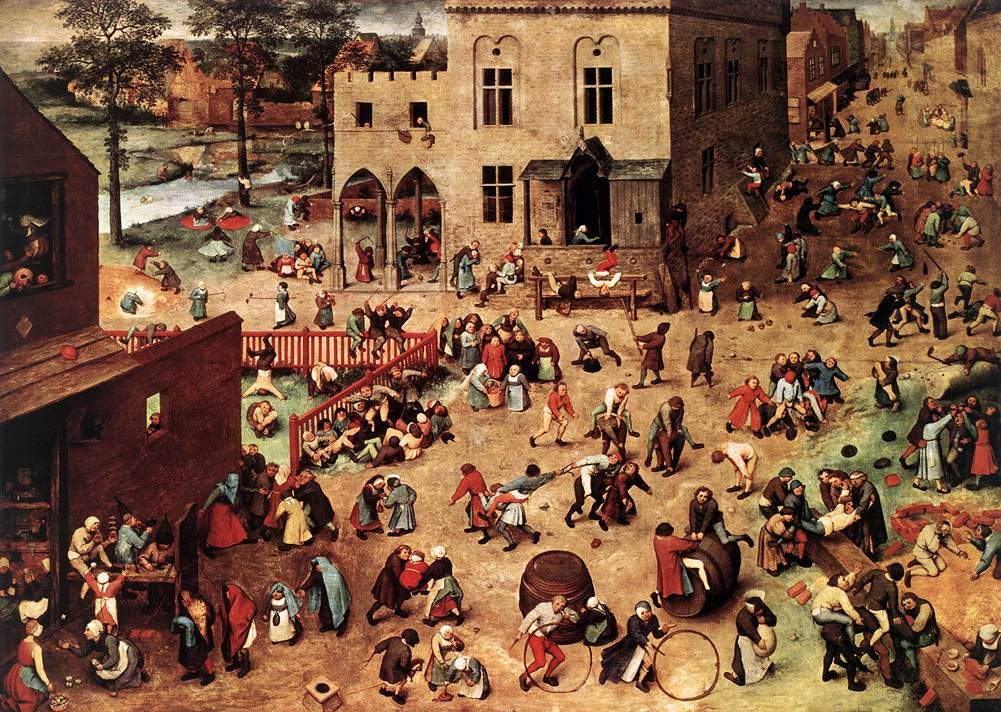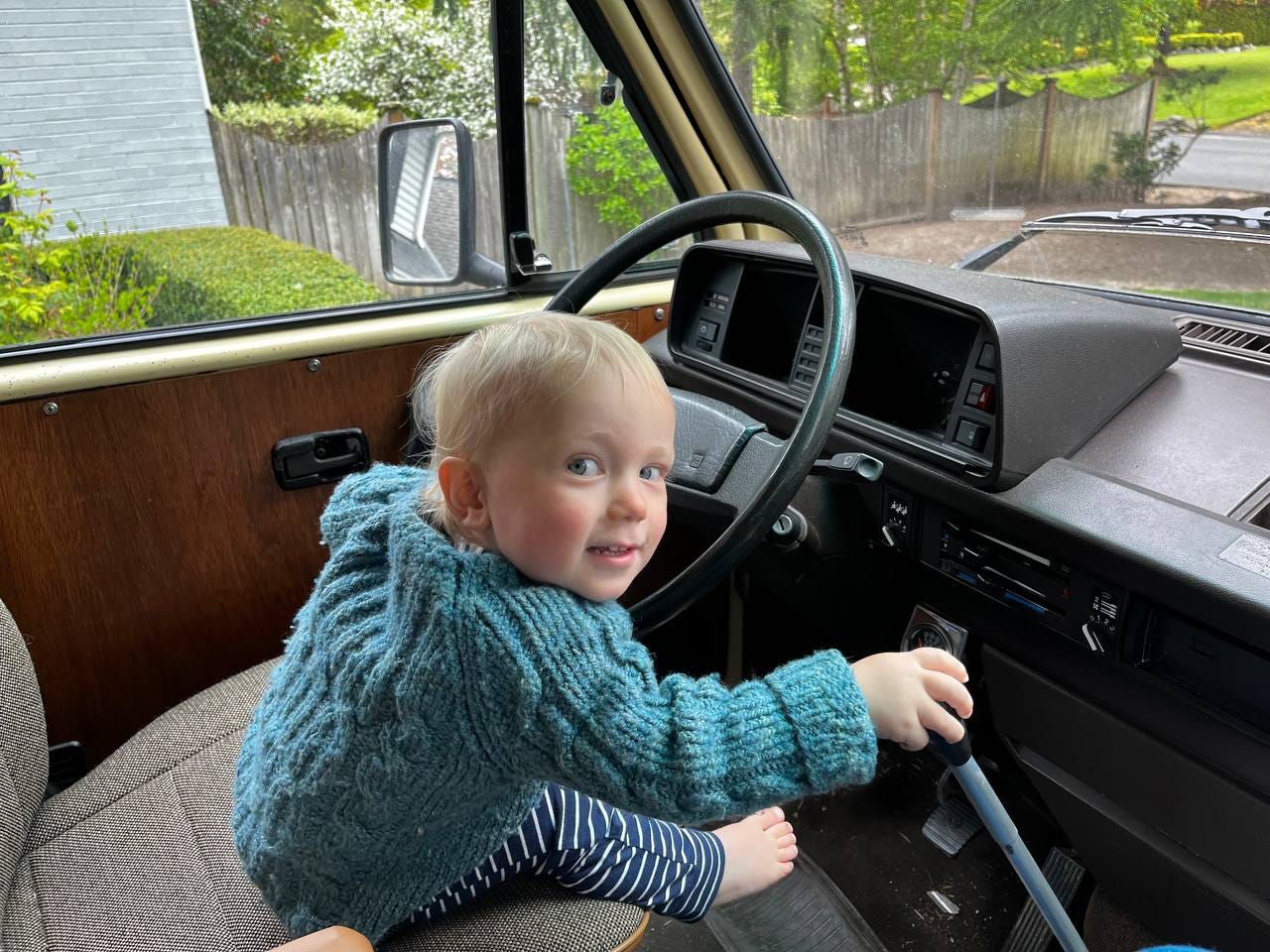Happy Friday! ✨
I’ve been reading Kristen R. Ghodsee’s Everyday Utopia, a wonderful resource filled with radical ideas on how communities could be better organized. There’s a chapter called “Kids as Public Goods” that explores the idea of collective childcare.
It struck me during a dinner with Eileen and Calvin, young parents in their 20s with their ~1-year-old, Arthur. They carry Arthur everywhere—always multitasking, sacrificing personal time and professional opportunities, skipping late-night parties and events to care for their child.
… anyone who has ever spent days, weeks, or months on end looking after infants knows that it is tedious, exhausting, and repetitive work punctuated by sleep deprivation and ceaseless demands, which is why the wealthy often hire live-in nannies and au pairs.
– Everyday Utopia, Kristen R. Ghodsee
In today’s world, where having kids is optional rather than expected, what parents are doing is, in essence, a public good. The little humans they raise will eventually become essential members of society—paying taxes, building infrastructure, inventing tools, caring for others, and continuing the human story.
As a childless adult, I’m not wiping diapers or soothing crying babies in the middle of the night — but I will inevitably benefit from the labor of those who do.
Brink Lindsey touches on this tension between personal fulfillment and societal continuity talking about Human Flourishing on the Edge City Podcast:
you can live a wonderful fulfilling life without ever having children. But if a society gives up on parenting, that society cannot flourish – because it cannot reproduce itself, it's a dead end.
Individuals could flourish without kids in the picture, but if we all do it, then there’ll be no more ‘we’.
Utopian Visions for Childcare

The idea of collective child-rearing has deep historical roots. Plato's Republic (ca. 370-360 BC) was one of the earliest conceptions of a Utopia and proposed communal rearing of children liberating individuals from nuclear family templates. Plato recognized that this could eliminate the favoritism and inequality that comes from private family arrangements.
Thomas More's Utopia (1516), which coined the modern term, described a perfect political and social system where equality was attained through community of property and equitable sharing of labor, including community rearing of children. More's work gave great impetus to Utopian literature and established patterns that would influence thinking for centuries.
Francis Bacon's New Atlantis (1627) envisioned communities organized around collective knowledge-sharing and child development. These weren't just abstract theories—they were responses to real problems of their time that persist today.
Even earlier, Aristophanes’ Assemblywomen (391 BC) portrayed women instituting a proto-communist society that included shared parenting duties.
Across centuries, humanity’s brightest minds have returned to the same idea: the best societies don’t raise children alone.
Naturally, More Intelligent Kids

The benefits of multiple caring adults in children's lives aren't just intuitive—they're scientifically documented. A meta-analysis by Ahnert, Pinquart, and Lamb (2006) found that:
Children who developed secure attachments with multiple caregivers exhibited stronger social-emotional outcomes, including greater independence, empathy, and goal-directed behavior.
In Everyday Utopia, Kristen follows with her statement:
It seems that growing up in a collective environment provides children with an earlier and stronger form of personality development that builds on secure attachments with their parents and immediate caregivers, but expands as children learn to negotiate a more complicated social environment at an early age.
This makes perfect sense! One or two adults, no matter how devoted, have limited perspectives, skills, and energy. But a child who regularly interacts with a carpenter, teacher, musician, programmer, and chef isn't just getting different skills — they're seeing different ways of thinking, different approaches to problems, different models of what it means to be human.
Our ancestors understood this intuitively. Extended families, village neighborhoods, and community ties meant children naturally had access to diverse adults who cared about their development. We’ve systematically compromised these networks in modern lifestyles, in which parents and children struggle, and it doesn’t have to be that way.
Collective Childbearing in Co-living Today
Here are a few inspiring real-world examples of modern collective parenting:
FractalNYC - When Tyler Hammond came to Edge Esmeralda and gave a presentation on FractalNYC, he talked about how Fractal has developed a culture of collective childcare. Because lives are shared, many childless young adults get to play with kids, and parents get to take time off and have personal freedom. It's not mandated or formal—it's become a natural outcome of multi-generational co-living.

Radish - Phil Levin’s co-living community, Radish, is a living example of what collective child-rearing can look like. His Supernuclear blog is a goldmine of insights on co-living and parenting in community. Radish transforms the isolating experience of parenting into one that’s shared—and joyful.
Edge City - Janine Ledger, co-founder of Edge City, is a strong advocate for multi-generational communities, especially in frontier tech and culture. When kids are part of the workplace ecosystem, priorities shift. People care differently. That kind of presence is something many high-tech spaces lack.
Motherhood is a Sacred Job (That We Often Undervalue)
Women who become mothers face systemic discrimination in hiring, promotions, and pay. We sing praises of mothers but punish them economically for doing perhaps the most important work in society.
Let’s be real: the “motherhood penalty” is still devastatingly true.
The invention of daycare and kindergarten wasn’t just a social good—it was a feminist and socialist recognition that exclusive parenting duties placed on women were unjust and inefficient.
Women across the liberal and radical spectrum, many of whom belonged to dissenting religious congregations, recognized the kindergarten as a space to build a new society that empowered their supposed natural capabilities for love and care.
I deeply resonate that society thrives when children are cared for and when mothers can fully participate in public life.
If I Could Dream ✨
I wish there were more places designed for children to thrive—places where kids are seen as central, not an afterthought, where raising children feels joyful, rejuvenating, purposeful, instead of burdensome, stressful, and at huge opportunity costs.
Imagine living spaces where children can watch and participate in real work, real problem-solving, and real creativity. Places where different generations collaborate on meaningful projects, where kids learn by doing alongside adults who are passionate about their work.
This future is already blooming in pockets. Liminal Village is one such place. I met their team at Traditional Dream Factory and was blown away by their wisdom and commitment for raising the next generation, check out their story here.
Rina Patel (whom I met at Edge Esmeralda) is passionate about new forms of education and childbearing, she collected a wonderful list of resources on the topic of alternative childcare & education:
Rebel Educator — big in alternative education
Boundless — Nomad Traveling Families Cohorts
Moonrise — a new resource for homeschoolers
There are more info on my previous blog post about alternative education — School for Human Arts
Food for Thoughts
Imagine:
A place where kids grow up in the thick of life with caring guardians — tinkering with artists, building with engineers, planting vegetables with poets.
A place where elders and toddlers swap wisdom, learning feels like play, and childbearing becomes a collective adventure. ✨
If you have any insights about this topic, please share with me! Would love to hear more 🙂

Thank you for reading Grid Free Minds~ This blog is a labor of love.








Yes, please! As a very devoted and involved Father, I can attest to the drain that our dominant nuclear family model can be. It is one of the many things that drives me towards building a network of healing villages in our BioRegion.